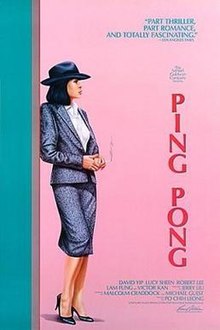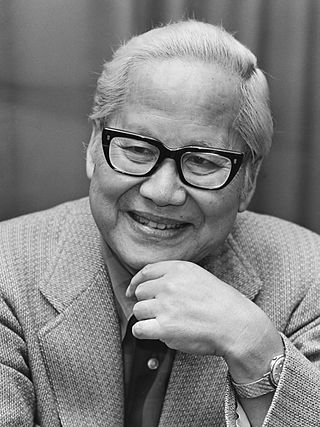
Keye Luke was a Chinese-American film and television actor, technical advisor and artist and a founding member of the Screen Actors Guild.

Drunken Master is a 1978 Hong Kong martial arts comedy film directed by Yuen Woo-ping, and starring Jackie Chan, Yuen Siu-tien, and Hwang Jang-lee. It was a success at the Hong Kong box office, earning two and a half times the amount of Yuen's and Chan's previous film, Snake in the Eagle's Shadow, which was also considered a hit.

Benson Fong was an American character actor.

The Grand Bauhinia Medal is the highest award under the Hong Kong honours and awards system; it is to recognise the selected person's lifelong and highly significant contribution to the well-being of Hong Kong. The awardee is entitled to the postnominal letters GBM and the style The Honourable. The award was created in 1997 to replace the British honours system, following the transfer of sovereignty to the People's Republic of China and the establishment of the Hong Kong Special Administrative Region. The list was empty because no one was awarded from 2003 to 2004. Bauhinia, Bauhinia blakeana, is the floral emblem of Hong Kong.

The Silver Bauhinia Star is the second Bauhinia Star rank in the honours system of Hong Kong, awarded to people who have taken a leading part in public affairs or voluntary work over a long period. The award was created in 1997 to replace the British honours system after the transfer of sovereignty to People's Republic of China and the establishment of the Hong Kong Special Administrative Region.
The Gold Bauhinia Star is the highest Bauhinia Star rank in the honours system of Hong Kong, created in 1997 to replace the British honours system of the Order of the British Empire after the transfer of sovereignty to People's Republic of China and the establishment of the Hong Kong Special Administrative Region (HKSAR). It is awarded to those who have given distinguished service to the community or rendered public or voluntary services of a very high degree of merit.

Out for a Kill is a 2003 straight-to-video action film directed by Michael Oblowitz. It stars Steven Seagal.
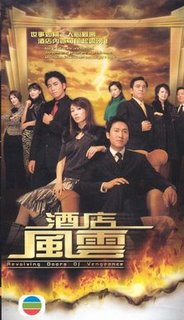
Revolving Doors of Vengeance is a 30-episode TVB series which was released in 2005. The fictional Royal Court Hotel is based on Crown Prince Hotel, which is located in Dongguan, Guangdong province of China.

Lam Sai-wing was a Hung Gar martial artist. He was a student of the Chinese martial artist, acupuncturer and folk hero of Cantonese ethnicity, Wong Fei-hung.

The Bronze Bauhinia Star is the lowest rank in Order of the Bauhinia Star in Hong Kong, created in 1997 to replace the British honours system of the Order of the British Empire after the transfer of sovereignty to People's Republic of China and the establishment of the Hong Kong Special Administrative Region (HKSAR).
A list of awards given to members of the Hong Kong Civil Service:

Lee Tung Foo was a Chinese American Vaudeville performer born in California who performed in English, German, and Latin. He became a film actor later in his life.
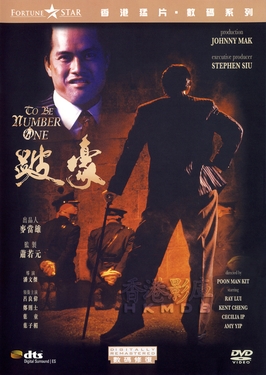
To Be Number One is a 1991 Hong Kong gangster film directed by Poon Man-kit, and produced by Stephen Shiu. The film is based on the rise and fall of a real-life gangster Ng Sik-ho, who is portrayed in the film by Ray Lui. To Be Number One was a critical and box office success, grossing HK$38,703,363 at the Hong Kong box office and winning the Hong Kong Film Award for Best Film at the 11th Hong Kong Film Awards. In 2017, the film was remade as Chasing the Dragon.
One Hundred Years: History of the Chinese in America is a 1952 mural painting by James Leong.

The Menu, is a 2015 television series produced by Hong Kong Television Network. The series is starred by Noel Leung, Catherine Chau, Kate Yeung and Gregory Wong, written by Pun Man-hung and directed by Ben Fong. The first episode premiered on 10 March 10, 2015. The plot revolves around the newspaper business.
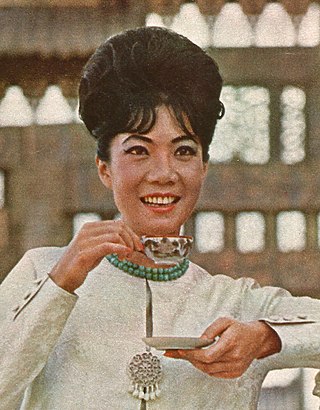
Barbara Lee, who used the stage name Barbara Yu Ling, was a Singapore-born actress of stage, screen, and television who was based in Britain from the 1950s. One of the first Singaporean Chinese actresses to gain attention in Europe, she appeared in productions of Madame Butterfly and The World of Suzie Wong. Among the films she appeared in were The Satanic Rites of Dracula (1973), Ping Pong (1986), and Peggy Su! (1997).

Heart and Greed is a 2017 grand production drama produced by TVB and Tencent Penguin Pictures. It is the third installment of the Heart of Greed series following Moonlight Resonance. It stars Bosco Wong, Louise Lee, Ha Yu, Michelle Yim, Susanna Kwan, Louis Yuen and Joseph Lee from the previous installments, and with new additions Vincent Wong, Eliza Sam, Priscilla Wong, Sharon Chan, Michael Tong and Ram Chiang.

The Jade Pendant is a 2017 American Western film directed by Leong Po-Chih and starring Godfrey Gao as Tom Wong, Clara Lee as Peony, following a tragic love story leading to the largest mass lynching in American history, of 19 Chinese immigrants in Los Angeles' Chinatown, in 1871.

James B. Leong was a Chinese-American character actor and filmmaker who had a long career in Hollywood beginning during the silent era.

Ping Yuen and North Ping Yuen form a four-building public housing complex in the north end of Chinatown, San Francisco along Pacific Avenue. In total, there are 434 apartments. The three Pings on the south side of Pacific were dedicated in 1951, and the North Ping Yuen building followed a decade later in 1961. Some of the largest murals in Chinatown are painted on Ping Yuen, which are prominent landmark buildings taller than the typical two- or three-story Chinatown buildings that date back to the early 1900s.
